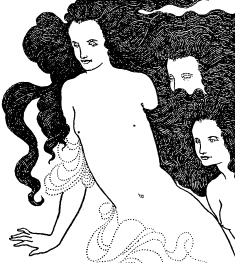Bawdy Language: Book Excerpts
As a public service, to advance the world's awareness and understanding of the origins of curse words, swear words, dirty talk, and sexual slang, and to whet your appetite for more, we offer for your pleasure a page from each chapter. These samplers provide a good sense of the subject matter of each chapter, each of which is self contained. They are cool both for reading and as a gift. Individual chapters can be downloaded at a mere $1.99 each. Such a bargain!
One of a Kind: Book I - The Erotic Tongue
The Erotic Tongue
Haste Makes Waste: The Book of the TOILETTE

Q. Was your first sexual experience heterosexual or homosexual?
A. I was too polite to ask.
— Gore Vidal, replying to question
by David Frost, 1971


Scholars approached it from both sides, first creating the homogenic, the homoerotic, and the homophile; later, the simulsexual and the isosexual. Some made their feelings even clearer with the controsexual, or by cutting him down to size as a homo (also homie, c. 1925).
As the word became increasingly identified with men, it inspired the feminosexual, which created a new problem. If men were homosexuals and women feminosexuals, what were they collectively? From this dilemma there briefly emerged the intersexual.
Our most current entry is the proposed herosexual, who sounds as if he came out of a telephone booth rather than the closet. America, however, is not quite ready for that one.
Is it any wonder that we finally returned to the homosexual, the worst of all possible words — save all others.
Out of This World
It's not as if there weren't plenty of other options. Urnings may sound like something out of Dr. Seuss, but they really were the creation of Dr. Karl Heinrich Ulrichs (1825-1895), a nineteenth-century scientist. He was one of the first to try to explain and clas- sify such behavior, calling it uranism, a condition he described as the female soul residing in a male body. Urnings and uranism came from the numerous references to Uranus in Plato's Symposium, which idealized homosexual activity. Like Plato, the good Doctor always wrote on the topic with both sympathy and understanding.
Urnings, however, never caught on among Ulrichs's colleagues or within the lay community. And we are now the sadder for it, having lost a colorful and expressive term. Contemporary media would have simply adored it — what with some guy "urning a living" and two men "urning for each other." With several successful trips already to the moon, it would almost seem natural to also anticipate a trip to Uranus.
133

